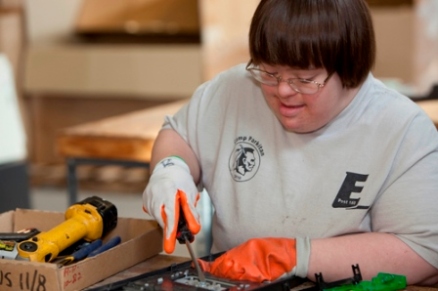As Catholics, our faith compels us to hear the cry of the poor, the meek, the lowly and the rejected. We are to care for our brothers and sisters in need: the unborn, the prisoner, the poor, the elderly, and people with disabilities. Despite our efforts to care for those on the margins of society, we have a long and dark history of neglecting those with intellectual and developmental disabilities—subjecting them to eugenics programs, banishing them to institutions, and shortchanging them when it comes to funding basic services for those totally dependent on the care of others.
Our own Commonwealth has its own stained past with regard to its treatment of citizens with disabilities. Until the late 1970s, state health officials arbitrarily sterilized individuals with intellectual and developmental disabilities (ID/DD), kept them in institutions and underfunded vital services for people with special needs. The shortchanging of our fellow citizens with disabilities continues even today.
The U.S. Bishops’ Pastoral Statement on Disabilities, issued in 1978 and again in 1989, reminds us that “we are a single flock under the care of a single shepherd. There can be no separate church for persons with disabilities.” Likewise, there can be no separate community for individuals with disabilities. Unfortunately, this is often the case. Through much of the 20th century, our society sought to eliminate those who are differently enabled from our midst, locking them away, keeping them from view.
Caring for our brothers and sisters with special needs is not only a matter of our call to aid those in need, but an extension of our call to protect life. “Defense of the right to life implies the defense of all other rights that enable the individual with the disability to achieve the fullest measurement of personal development of which he or she is capable,” as the Bishops further remind us in their Pastoral Statement. As such, ensuring that our fellow Virginians with disabilities receive fully-funded services is a pro-life issue in addition to an economic justice issue.
In 2011, Virginia’s efforts to comply with the Americans with Disabilities Act (ADA) and the U.S. Supreme Court’s Olmsted decision—which mandates that individuals with ID/DD receive services in the least restrictive environments to meet their needs—was investigated by the U.S. Department of Justice and found lacking. Seeking to avoid a protracted and costly legal battle, Virginia entered into an agreement with DoJ in 2012 to accelerate compliance with both the ADA and the Olmsted decision by increasing funding for Medicaid waivers for people with ID/DD and closing state “training centers”.
Our Medicaid program provides “waivers” for individuals with ID/DD. These waivers provide essential services to people with intellectual and developmental disabilities. Many of these services entail tasks most of us take for granted, such as personal hygiene care, toileting, household chores and transportation.
Currently, more than 8,100 individuals are on the waiting list for I/DD waivers. Providing funding for an additional 1,000 ID waivers and 400 DD waivers per year will not only prevent further growth of the waiting lists, it will put the Commonwealth on track to eliminate the ID Waiver Urgent List and the DD Waiver Waiting List within the next 5 years. This action will also complete the goal of eliminating the ID Waiver Waiting list in the next 10 years.
Unfortunately, lawmakers in Richmond continue to delay compliance with the DoJ agreement by underfunding services to those in desperate need of assistance. The House budget only appropriates 50 ID waivers and 15 DD waivers over and above the 700 ID waivers and 50 DD waivers proposed in December by Governor McDonnell. The Senate budget actually eliminates 225 ID waivers and 10 DD waivers from McDonnell’s proposal, by trying to take credit for waivers appropriated last year in excess of the number required by the DoJ agreement.
As legislators continue to work out the details on the budget, urge them to fulfill their duty to provide basic services for those who cannot help themselves by appropriating 1,000 ID waivers and 400 DD waivers annually.
Photo Credit: www.thearc.org
